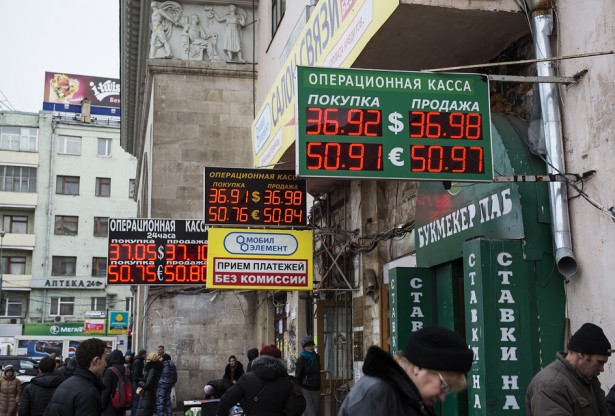One day after the Russian government confirmed that it would not impose currency controls because it did not believe in them, it was announced that Moscow would in fact institute informal currency controls by ordering exporters to sell their foreign exchange currency revenues to aid the ruble.
Russian Prime Minister Dmitry Medvedev signed an order requiring the nation’s biggest state exporters to sell a certain amount of their forex currency revenues to assist in the government’s plight to stabilize the nation’s currency. It is expected within the next two months that companies may give the market approximately $1 billion each day that could contain volatility.
Some of the companies include diamond producer Alrosa, oil firms Rosneft and Zarubezhneft and gas company Gazprom. The Bank of Russia told Reuters that it would be meeting with exporters to explain to them that forex currency revenue sales can incite forex market stability.
“Steady forex revenue sales during the year is beneficial both for the support of forex market stability and for hedging risks of exporting companies,” the central bank said.

During the Tuesday trading session, the ruble gained about three percent against the United States dollar. The ruble has been beaten since the beginning of the year and has lost about half of its value when compared to the greenback. Some of the reasons for its downfall include the Ukraine conflict, economic sanctions and falling oil prices.
“Of course, the companies are free to hold on to the hard currency, they are also free to get involved in speculative operations. But then we reserve the right not to help them if and when they hit tough times,” said a government source, who asked not to be named, in an interview with the news service.
In the meantime, government officials are monitoring and checking financial institutions to find out their currency positions and who is exactly purchasing foreign currency. Although the government continues to claim it is not implementing currency controls, these types of acts could very well signify that they are.
Speaking at a meeting of his political party, Medvedev warned Tuesday that Russia faces the risk of entering a recession next year, echoing the remarks of a former finance minister who told reporters that Moscow will face the full effects of its destructive policies in 2015.
Medvedev blamed other factors and nations for the collapse of the country’s economy. He also noted that the central bank’s decision to raise interest rates to 17.5 percent was only a temporary one and would be reduced as soon as the ruble stabilized. It may take a while, however, considering the fact that the ruble has been the worst performing currency in the open market this year alongside the Ukrainian hrvnia.
President Vladimir Putin’s right-hand man added that he thinks the nation’s companies will act responsibly, but added that no one will be sent to Serbia if they do not follow through on these requests. For decades under the Soviet Union, those who did not follow orders, defectors, detractors, dissenters and so on were sent to Serbian concentration prison camps.




